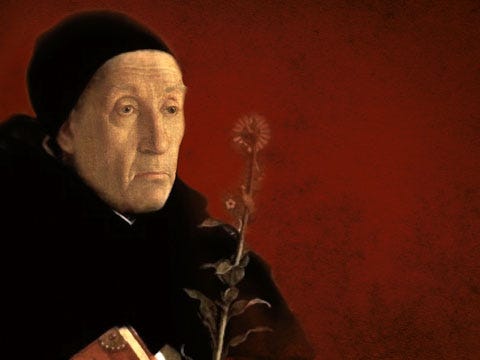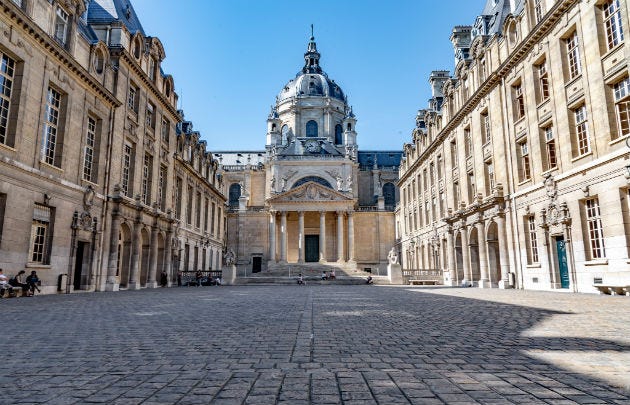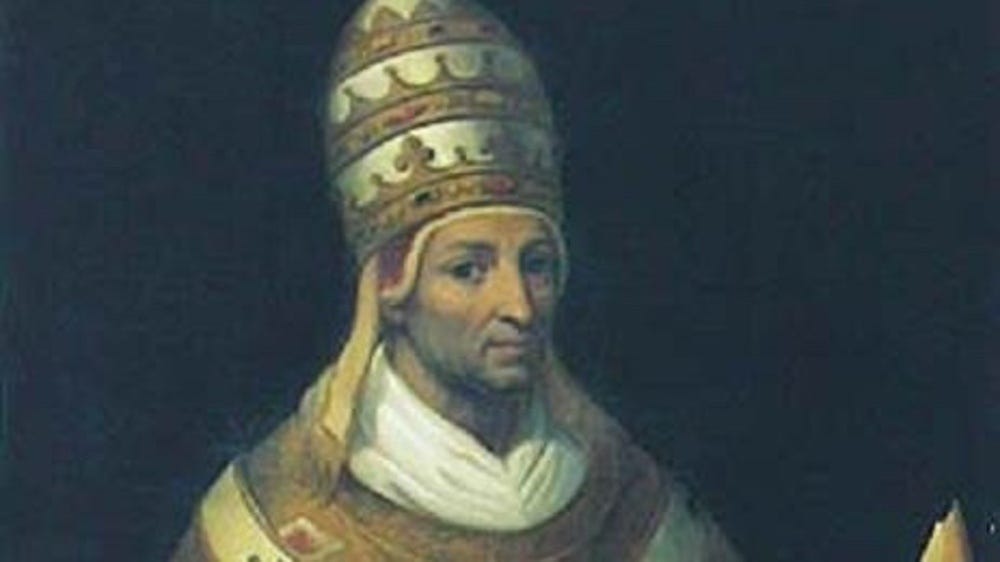We are all meant to be mothers of God. What good is it to me if this eternal birth of the divine Son takes place unceasingly but does not take place within myself? And what good is it to me if Mary is full of grace if I am not also full of grace? What good is it to me for the Creator to give birth to his Son if I also do not give birth to him in my time and my culture? This, then, is the fullness of time: when the Son of God is begotten in us.
Advent Day 5: Meister Eckhart (1260-1328)
When my parents celebrate my birthday, they’re not commemorating the details of what happened the day I was born. That I arrived on Easter Sunday at 3:33 a.m. and weighed seven pounds means nothing. Rather, what they celebrate and contemplate is my breaking into their world, and the ongoing meaning of me in their lives.
And so it is with Christians and Christmas. On December 25th, we don’t celebrate the arrival of a baby, but the revelation of Jesus as God’s love among us, and the ongoing meaning of that. How to live, work with, and contemplate that mystery was Meister Eckhart’s passion.
For Eckhart, how we do Christmas is how we do our lives.
Born in 1260 in the Rhineland of Germany, Eckhart joined the Dominican order at age eighteen. Eventually, he found his way to France where he was a popular lecturer and preacher at the University of Paris. His popularity derived from his sermons which addressed the lives and concerns of everyday people, particularly the poor, and which were delivered in the local vernacular rather than Latin.
The latter point was a radical move on Eckhart’s part. In general, Latin was spoken with fluency only by priests and the upper classes. This linguistic exclusivity helped maintain the power of the church hierarchy and social structures that grossly favored the aristocracy. That Eckhart broke down the language barrier between the people and God did not sit well with many of his priestly brethren. Nor did Eckhart’s egalitarian views of women and the poor.
The heart of Eckhart’s spirituality was his belief that Christ was the very ground of being, that everything flowed from God and contained God’s divine imprint—that God is in us and we are in God. If Christ is the Word, then we are junior Words.
Eckhart drew his views from personal experiences informed by the scriptures.
Because I live, you also will live. On that day you will realize that I am in my Father, and you are in me, and I am in you. John 14:19-20
For in God we live and move and have our being. Acts 17:28
From eternity, in the beginning, he created me, and for eternity I shall remain… I am like a vine putting out graceful shoots, my blossoms bear the fruit of glory and wealth… Sirach 24:9, 17, 19-20
As a preacher, Eckhart sought to awaken all people to this divine spark within their souls.
When I preach, I usually speak of detachment and say that a man should be empty of self and all things; and secondly, that he should be reconstructed in the simple good that God is; and thirdly, that he should consider the great aristocracy which God has set up in the soul, such that by means of it man may wonderfully attain to God; and fourthly, of the purity of the divine nature.
Once awakened, one would be empowered to know God on their own, within their own souls, and also to accept the responsibility and joy of co-creating a better, more loving and hopeful life for themselves and others.
We are fellow helpers with God, co-creators in everything we do. When Word and work are returned to their source and origin, then all work is accomplished divinely in God.
For Eckhart, all flowed from God through Christ to us and back to God in the divine circle dance that the early church fathers called perichoresis and which we call the Trinity. Each and every moment we return to God the loving-kindness we receive from God, we are rebirthing Christ. In this way, we become mothers of God. Though the birth of Jesus was a one-time event at the first Christmas, Christ is born again and again in our souls through acts of love, charity, mercy and compassion.
God does this: He begets his only begotten Son in the highest part of the soul. At the same time he begets his only begotten Son in me, I beget him again in the Father.
Eckhart’s participatory, unitive spirituality is a hallmark of the New Testament, witnessed to by Jesus, Peter, Paul, and the gospel writers, as well as the mothers and fathers of the early church mothers and mystics throughout the ages. But, in the Middle Ages—and still today, in some places—a spirituality that did not necessitate the mediation of priests or church was considered dangerous.
In 1326, in a political move, Eckhart’s archbishop brought him up on charges of heresy. This was a time when the church was in the early stages of the social tumult that would eventually lead to the Reformation. For the powers-that-be, Eckhart’s liberating message to the peasants only added to the restive mood and came at the expense of unquestioned church power. Another strike against Eckhart was his fervent support of the Beguines, laywomen who lived as monastics but who took no vows and held no allegiance to an established order.
In his own defense, Eckhart offered only that he wanted to inspire people to do good.
After being convicted, he appealed to Pope John XXII. The pope set a trial, but before it was over Eckhart died. He was convicted anyway. His crime? According to the pope, Eckhart wished to know more than he should, and not in accordance with…the measure of faith. In other words, Eckhart had a mind and heart of his own.
Though Eckhart was silenced, and forgotten for a time, he has had the last word. Since his rediscovery by 19th century German philosophers, he has been recognized as a spiritual giant by a wide range of people including psychologists, theologians, and Christian mystics as well as Hindus and Buddhists who see parallels between his thought and their own traditions. Even the Vatican came around, eventually. In 1992, the one-time heretic was declared a good and orthodox theologian.
For Eckhart, everything he said and did was to help himself and others clear the path to God, so that we might, every day, give birth to Christ in ourselves and the world…a Christmas without end.
Practice
Meister Eckhart believed that we are all Words of God and that it is our duty and joy to give birth to Christ in our lives. Today, make a list of the ways you give birth to the peace, forgiveness and lovingkindness of Jesus. Works of creation and creativity are great, but consider focusing on the thousand small ways you can birth Christ in a day. Think especially of interactions that might normally frustrate, stress or bore you. How do you birth Christ in traffic? In a difficult conversation? While doing a household chore?
If you want, think of this as an extension of the practice from Day 1.
Holiday Happenings at Life In The City
Dec 10, 11:15 am: LITC’s original holiday musical, Make Room In Your Heart.
Dec 21, 7 pm: Blue Christmas, an intimate service for the darkest night of the year.
Dec 23, 6 pm: Christmas Eve-Eve, an annual LITC tradition
Dec 24, 11:15 am: LITC’s regular Sunday service
Dec 31, 11:15 am: A fun, casual service with cookies and coffee to welcome 2024
Ready For More?
Read the Introduction to the 2023 edition of The Heart Moves Toward Light: Advent With The Mystics, Saints and Prophets.
Find more mystics, saints and prophets in our Archive.
Feedback
Did you catch a typo? Do you have suggestions for mystics, saints and prophets we might cover in the future? Leave feedback in comments section below or email Greg Durham at greg@lifeinthecityaustin.org.








This is so beautifully written, Greg! I would love for this to be published and out in the world so that even more people could benefit from this wisdom! 😉😘❤️
I loved the detail about Echkhart’s use of the common tongue. Simplifying our language when communicating the good news of Jesus helps us to connect with everyone. While seminary vernacular may be appealing to some, it can create a privileged class like Latin did in Eckhart’s day.